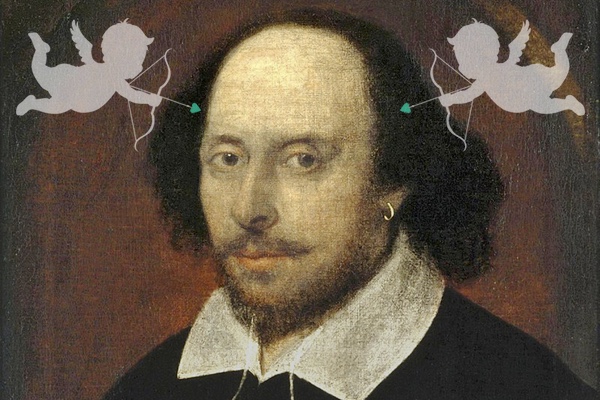Trying to Love "Shakespeare in Love" (The Play)

Back around 1593, when William Shakespeare was writing the play Romeo and Juliet, he could never have known that his work would not only last more than four centuries, but be turned into a box office smash movie, Shakespeare in Love, that won seven Oscars and made Gwyneth Paltrow a superstar.
The success of the movie has propelled others to turn it into a stage play. This year, it will be the most produced play in the United States.
It is one of my favorite movies and I watch it whenever it is on television. It is a delicious love story about the writing of the stage’s great love story. In it, playwright Shakespeare falls in love with the disguised woman betrothed to a quirky Lord who is on his way to the United States to colonize Virginia. The story has its ups and downs, big whooshes, lots of hugging, legendary lines and a few rounds between the royal sheets. I love it.
The stage play is not so great. A version of it opened Saturday at the Shakespeare Theatre of New Jersey at Drew University, in Madison, N.J. It is really, really long (just about three hours), it has lots of people running about for apparently no purpose and features a very tired Will Shakespeare who looks more like he just finished building a house than writing a play.
The start of the movie is fresh and exciting and gets right into the love story between Will and the woman, who meets him dressed as a boy in order to land a role in his play. In the stage play, that comes much later. The beginning of the play is full of talk, a silly dog running around the stage and add-ons, such as Shakespeare working on a sonnet and a play at the same time and fearful of how the world will compare him to his friend, playwright Christopher Marlowe.
The characters are wrong. Lord Wessex, Viola’s intended, is tough and resilient in the play, but in the film, he was wonderfully angry, jealous and totally lost in the world, unsure of everything he did.
Viola in the movie is always worried about her relationship to both Wessex and Will, but in the play she is pretty sure of herself, really in charge, the CEO of 16th century London. It does not work.
Will Shakespeare is not the great playwright at all here, but a writer who seems like he is more at home writing Costco brochures than magnificent dramas.
The acting in the play, adapted for the stage by Lee Hall, who uses much of the movie script by Tom Stoppard and Marc Norman, is fine, as is the direction by Bonnie Monte. They just labor with a disorganized script. Among the fine performances are John Barker as Shakespeare, Whitney Maris Brown as Viola, Marcus Dean Fuller as Wessex, David Andrew MacDonald as Richard Burbage, Anthony Marble as Marlowe and Erika Rolfsrud as the Queen. The play has some music by Paddy Cunneen.
With about twenty minutes left in the first act, Shakespeare in Love finally rights itself and grabs hold of the movie story. From then on, it is OK.
The end of the movie, with Viola walking up the beach from the ocean to the shores of gorgeous Virginia, is wonderful, but the convoluted ending of the play is not (of course, in Madison you do not have the Atlantic Ocean to work with, always a drawback).
If you can weather the first act, the play turns out all right. The man who adapted it to the stage, Lee Hall, also added some nice touches, such as the writing of sonnets and a wonderful line at the end of the play in which Viola assures Shakespeare that his works will be ‘immortal’ in years to come. Hall also added some more lines from Romeo and Juliet, which was good.
The history of London or England that you learn from Shakespeare in Love? There is none. All of it is made up. There never was a Viola de Lesseps or a Romeo and Juliet behind the scenes love story (that anyone knows about). Some of the characters in the story were real, such as Marlowe and Queen Elizabeth, some actors and a stage owner but most are invented. And, worst of all, there is the ending. In both movie and play, you are told that in about 1593 Viola went to Virginia. There was no Virginia in 1593. It was not colonized until 1607.
Of course, you learn a lot about the idea of forbidding women to appear in plays in that era (all female roles were played by boys). You learn a lot about how the theater worked, primitive compared to today’s theater world. You learn much about the Queen, who in the play just loves dogs, and the Queen’s patronage of the theater and playwrights.
PRODUCTION: The play is produced by the Shakespeare Theatre of New Jersey. It was originally produced by Disney Theatrical Productions and Sonia Friedman Productions. Sets: Brian Clinnin, Costumes: Niki Delhomme, Lighting: Steven Rosen, Fight Director Rick Sordelet. It runs through November 12.